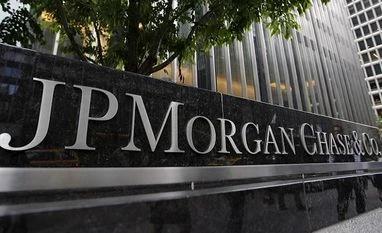JPMorgan to pay $920 mn for manipulating precious metals, treasury market
The settlement comes as the US banking giant reached a deferred prosecution agreement with the Justice Department
)
JP Morgan Chase & Co corporate headquarters in New York.
By Abhishek Manikandan and Michelle Price
(Reuters) - JPMorgan Chase & Co has agreed to pay more than $920 million and admitted to wrongdoing to settle federal U.S. market manipulation probes into its trading of metals futures and Treasury securities, the U.S. authorities said on Tuesday.
The landmark multi-agency settlement lifts a regulatory shadow that has hung over the bank for several years and marks a signature victory for the government's efforts to clamp down on illegal trading in the futures and precious metals market.
JPMorgan will pay $436.4 million in fines, $311.7 million in restitution and more than $172 million in disgorgement, the Commodity Futures Trading Commission (CFTC) said on Tuesday, the biggest-ever settlement imposed by the derivatives regulator.
Between 2008 and 2016, JPMorgan engaged in a pattern of manipulation in the precious metals futures and U.S. Treasury futures market, the CFTC said. Traders would place orders on one side of the market which they never intended to execute, to create a false impression of buy or sell interest that would raise or depress prices, according to the settlement.
Also Read
This manipulative practice, which is designed to create the illusion of demand, or lack thereof, is known as "spoofing."
Some of the trades were made on JPMorgan's own account, while on occasions traders manipulated the market to facilitate trades by hedge fund clients, the CFTC said. The bank failed to identify, investigate, and stop the behavior, even after a new surveillance system flagged issues in 2014, the agency said.
"The conduct of the individuals referenced in today's resolutions is unacceptable and they are no longer with the firm," said Daniel Pinto, co-president of JPMorgan and CEO of the Corporate & Investment Bank.
He added that the bank had invested "considerable resources" in boosting its internal compliance policies, surveillance systems and training programs.
In parallel settlements, the bank entered into a Deferred Prosecution Agreement with the Department of Justice and the United States Attorney's Office for the District of Connecticut, staving off criminal prosecution on charges of wire fraud.
It also agreed to pay $35 million to settle related charges with the Securities and Exchange Commission, although the bank's payment to the CFTC would offset that fine, it said.
In an unusual concession, JPMorgan also admitted wrongdoing in agreeing to the SEC and Justice Dept. settlements.
"This record-setting enforcement action demonstrates the CFTC's commitment to being tough on those who intentionally break our rules, no matter who they are. Attempts to manipulate our markets won't be tolerated," said CFTC Chairman Heath Tarbert.
The CFTC and Justice Department have taken aim at spoofing in recent years, using sophisticated data analysis tools to spot potential wrongdoing that it could not previously detect.
Reuters has reported that around 2017, the agency began using techniques it originally developed to spot healthcare fraud schemes to identify suspicious trading patterns, including by scanning activity on exchanges.
"The idea was: let's mine this data source to see who the worst actors are," Robert Zink, a top Justice official who helped lead the effort, told Reuters in May https://www.reuters.com/article/us-usa-doj-trading-insight/traders-beware-u-s-taps-new-tools-to-find-fraud-in-volatile-commodities-market-idUSKBN22X14E.
The agency has already charged six JPMorgan traders for manipulating metals futures between 2008 and 2016. On Friday, meanwhile, two former Deutsche Bank AG traders were found guilty https://www.reuters.com/article/us-deutsche-bank-traders-convicted/two-ex-deutsche-bank-traders-convicted-in-u-s-over-fake-orders-idUSKCN26H00X by a federal jury of spoofing, the agency said.
(Reporting by Abhishek Manikandan in Bengaluru; additional reporting by Jonathan Stempel, editing by Patrick Graham, Arun Koyyur, Nick Zieminski)
(Only the headline and picture of this report may have been reworked by the Business Standard staff; the rest of the content is auto-generated from a syndicated feed.)
More From This Section
Don't miss the most important news and views of the day. Get them on our Telegram channel
First Published: Sep 30 2020 | 8:49 AM IST


